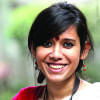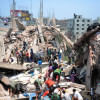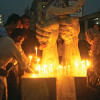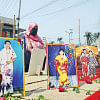Living with the ghost of Rana Plaza

Photos: Taslima Akhter
People tell her she is lucky to be alive, to have escaped the "clutches of death". They tell her to "count her blessings" for making it out of the rubble that was once Rana Plaza, with her limbs intact. They remind her of all those who didn't share her fate.
But 26-year-old Asma Begum, who was rescued on the 4th day of the collapse of Rana Plaza, cannot bring herself to feel elated – even thankful – for being alive. She has no appetite, no desires, no aspirations anymore. She cannot sleep at night; she cannot engage in long conversations with family or friends, without zoning out. She has one recurring thought in her head, "Why didn't I die that day and be relieved of this miserable existence?"
"I think to myself, why did my parents give birth to me? Was it so I could live this life of poverty and insecurity?" she asks. "Since the Rana Plaza disaster, I feel no joy in anything. I feel like a dead woman walking. What's the point of living like this?"
"I think to myself, why did my parents give birth to me? Was it so I could live this life of poverty and insecurity? Since the Rana Plaza disaster, I feel no joy in anything. I feel like a dead woman walking. What's the point of living like this?
The single mother of two, a boy and a girl, cannot figure out what happened to her during and after the collapse to make her feel so listless. After all, four years have passed since the day the eight-storey building came crashing down on her – enough time, as her friends and family tell her, to have "healed" and "moved on." Yet, she finds herself spiralling further and further down into a dark hole of depression. She still has frequent visions of the days she was trapped inside Rana Plaza – the rotting corpses piled on top of another, friends dying right in front of her eyes, rescuers sawing workers in half to pull them out of the ruins alive, the desperate cries of those on the verge of death, being forced to drink urine… These memories, she says, are triggered by words, smells, cries or enclosed surroundings. They keep her awake at night, four years on. But more than that, it's the overwhelming feeling that "life doesn't matter" that engulfs her, day and night.

Too traumatised to work again in a garment factory, which to her now seems like a death camp, Asma has been working as a domestic worker in Savar. She has to work three part-time jobs a month to sustain her family of three. "I drag myself to work with all the energy I can muster. But after I come back, my body gives in and I don't feel like getting up from bed all day."
Despite her debilitating mental condition, Asma has never seen a therapist or a psychiatrist. Therapy or mental health support is a luxury that few from her class or social location can afford. The most she has received as treatment is a regular supply of sleeping pills prescribed by her local clinic for her chronic insomnia.
Four years on, many of the 2,500 and more survivors of the collapse still showcase symptoms of being unwell, according to counsellors working with Rana Plaza survivors and families of victims. Many have not been able to work in enclosed spaces in factory settings for fear the walls would come crumpling down. Yet others have reported their inability to withstand loud noises which are characteristic of factory jobs or the cityscape. Many suffer from anxiety, short-term memory loss, anger issues and sleep disorders.
Shoeb Mahmud, Psychosocial Counsellor, BRAC Institute of Educational Development (BIED), shares that one of his clients, a Rana Plaza survivor, has developed such acute anger issues that she ties up her child and beats him up when he crosses her. Another one of his clients threw her child against the wall unable to control her anger. Some patients are suffering from acute anxieties and cannot even enter the walled premises in which he is providing counselling.
It is unclear exactly how many people are still psychologically affected by the man-made disaster, since there was never any systematic assessment of the mental condition of Rana Plaza survivors or their families, comprehensive support for psychosocial counselling or any follow-up about their recovery. According to a survey commissioned by ActionAid Bangladesh conducted over the last year, as many as 58.4 percent of 1300 survivors surveyed are still suffering from long-term psychosocial problems, 37.3 percent are more or less stable and only 4.3 percent have recovered fully. However, it was a perception survey and not a methodical assessment of victims' mental health, states Nuzhat Jabin, research analyst of the survey.
"When Rana Plaza collapsed, most of our efforts were focused on rescuing the victims, then giving them treatment for physical injuries and finally guaranteeing compensation. Although some organisations did provide primary counselling and worked with trauma patients, we just didn't have the capacity to focus on mental health in a comprehensive manner. There was no organisation which could take on the gigantic task of psychological assessment and follow-up of all the survivors or the families of the victims," argues Sultan Syed Sultan Uddin Ahmed, Executive Director of Bangladesh Institute of Labour Studies (BILS), whose organisation was involved in the rescue and rehabilitation process of workers from the first day of the collapse.
"I drag myself to work with all the energy I can muster. But after I come back, my body gives in and I don't feel like getting up from bed all day.
Furthermore, the compensation process, finally concluded on October 2015, mostly focused on physical injuries. Although the Rana Plaza Agreement Coordination Committee – a multi-stakeholder body tasked with developing and overseeing financial support and level of medical care to be provided to the victims of the disaster – did include psychological injuries as a criterion for financial assistance, the final amount paid to mentally ill patients was negligible, mainly as there was no proper assessment of the vulnerability of traumatised patients, says Ahmed, who was a member of the Committee.
In a country like Bangladesh, there is still widespread stigma and misconceptions about psychosocial support, and an unwillingness to acknowledge the importance and severity of mental health issues. As Bithun Tasnuva Mazid, Senior Manager, Disaster Management and Climate Change (DMCC) of BRAC, argues, "Mental health is not taken seriously in this country, or else it's considered a taboo. This explains why people focused solely on physical injuries and ignored the widespread psychological trauma suffered by survivors. No one thought mental health was a priority, especially for workers who go through so much hardship in their daily lives."
Furthermore, workers, too, did not understand what counselling meant or what they would gain from coming to sessions, when they had more pressing needs, such as medical treatment or providing for their families, adds Bithun. Yet others did not see the point of going to a doctor to cure them of the pain of separation from their loved ones.

Rabeya Khatun, who lost three members of her family, including her only son Riazul Islam Khokon, cries herself to sleep every night, even to this day – if she can catch a wink of sleep at all, that is. "I think of him all the time. How my baby ate, how he slept, how he thought, how he walked, how he suffered… and I cannot breathe, cannot sleep," she says, in between sobs. Rabeya could not find the remains of her son anywhere, and did not even have the closure of burying his body and saying farewell. When asked if she had gone to a psychiatrist or therapist to help her through these difficult times, she retorts: "Am I mad that I would go to them? It's true that I have a stone pressing down on my heart now, but how can a doctor cure me of that? Only God can take me back to my son and rid me of this pain."
"I think of him all the time. How my baby ate, how he slept, how he thought, how he walked, how he suffered… and I cannot breathe, cannot sleep . . .
BRAC was one of the few institutions which provided mental health support to Rana Plaza victims during and after the disaster, aware of the socio-economic realities of the workers' lives. BRAC's Institute of Educational Development (BIED) worked on-site for a period of two months and subsequently provided both group counselling and individual counselling to the affected survivors or family members in collaboration with the DMCC programme of BRAC.
"We had to make them comfortable with the idea of counselling, and approach them in a way that did not alienate them," says Shoeb Mahmud."Sometimes we went to their places to provide counselling."
So far, as many as 730 survivors and family members have been assisted, through group sessions, or in more acute cases, individual sessions. Counsellors at BRAC have employed Eye Movement Desensitisation and Reprocessing (EMDR) therapy and different Neuro-linguistic programming (NLP) techniques, among others, to heal the wounds left behind by their traumatic encounters.
"Unfortunately, despite the best intentions, we cannot always provide as thorough a treatment as we would like, because of the project and resource limitations. As of now, we are providing a maximum of four sessions to those suffering from severe PTSD, but ideally, they would need at least six or more sessions, depending on the severity of their condition. Unfortunately, we have not been able to follow-up on our clients once the sessions are over," admits Mahmud.

Counsellors, development practitioners and activists feel that the country should develop an emergency response system to disasters with a special emphasis on psychosocial services.
"There is a severe lack of organised teams with the proper training and the proper vocabulary to address emergency situations of such extreme proportions as Rana Plaza," opines Dr. Kali Prasanna Das, psychosocial counsellor who provided primary counselling to Rana Plaza survivors. "When Rana Plaza happened, we all jumped in, in whatever capacity we could, but how many people could we really reach? The support was provided on an ad hoc basis."
Dr. Das believes that it is of utmost importance to develop teams who can respond immediately to a single call. After Rana Plaza, many counsellors did receive special training, but it is crucial to coordinate their efforts, further develop their capacities, train more people on psychosocial first-aid and increase general awareness on psychosocial issues and post-disaster trauma so that people can be assisted more effectively.
"Proper ventilation is crucial after a traumatic experience, but after Rana Plaza, we saw journalists and rescuers, and even ordinary people, ask detailed questions to survivors and families of victims, with no consideration of their mental state. They opened the wounds, and left them in that vulnerable state. This is very dangerous, and we need awareness of these basic concepts," says Mahmud.
It is unlikely that the survivors of Rana Plaza or family members who lost their loved ones can every fully recover from the incredible pain they experienced, or forget the horrors of being trapped alive, of sorting through rubble for mutilated remains of their wives and husbands, of seeing their friends and families bleeding to death. These memories will haunt them, as they say, till their death. However, with the proper care and support, their pain could have been – and still could be – lessened, their lives made a little less abject, their transition to a "regular" life a little smoother. For now, Asma sits staring blankly at walls, and Rabeya weeps over her son's belongings, waiting for life to pass them by.

 For all latest news, follow The Daily Star's Google News channel.
For all latest news, follow The Daily Star's Google News channel. 







Comments